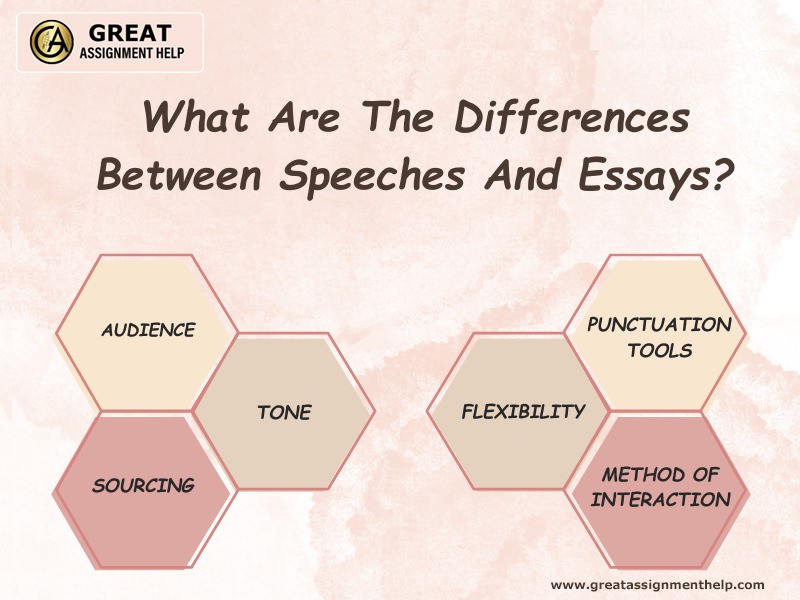Students who pursue an academic career in mass communication or journalism often need to write speeches and essays as a part of their assignments. While both speech writing and essay writing involve communicating information to a live audience, the method of communication is completely different. Moreover, they require distinctive methods to develop the copies. For example, the choice of diction and dramatic effect, throw of words and use of content, etc. Are you intrigued just by this distinctiveness? Do you wonder what are the differences between speeches and essays? If yes, then read this blog to learn the complete details.
Concept of Speech and Essay
Are you curious about what are the differences between speeches and essays? Then begin your journey by acquiring clear knowledge about the concept of speech and essay.
What is a speech?
When you deliver an oral presentation on a subject to a live audience, it is called a speech. Usually, you may have to give a speech at a formal or staged event. However, impromptu speeches are also common. Typically, most of the speech is scripted. It has an introduction, body, and conclusion. You only develop instant answers for the questions you get on the spot.
What is essay writing?
Essay writing involves discussion on a specific subject through a limited length of words. Here, you express your personal opinion on a subject based on the information you gather. Academic essays test a student’s knowledge of a specific subject and also encourage developing writing skills. When you write your essays, you aim to persuade the reader to your point of view by sufficient use of evidence that supports the topic of your writing.
Also read: How to Start an Essay with a Quote? Learn with Examples
Similarities between a Speech and Essay
Although speech and essay reside in different poles, it is quite interesting that they both have some similarities. For example, both speech and essay can persuade the audience. They can be informative and argumentative as well.
Additionally, just like a speech, an essay has an introduction, a body, and a conclusion. Both of them begin with an introduction to the subject. They share some background information and state the central theme of the discussion. Then, they move to the body of content. Here, both the essay and speech use evidence and argument to support the primary theme. Finally, in the conclusion, the subject sums up and leaves a lasting impression on the reader or the audience.
These are the two prominent similarities that you can find between a speech and an essay. Otherwise, they are distinctive in every way.
Differences between Speeches and Essays

Speeches and essays are different from almost every angle you look at. Here are the prominent differences between the two:
1. Audience
You must consider your audience when you write an essay or a speech. If you write an essay about a research breakthrough for a research journal you need not explain technical vocabularies, as you can expect the readers who go through it will be familiar with the technical terms. However, when publishing the same essay to a platform that is not related to the research you can expect that the readers will not be familiar with the issues you detailed in the essay. Hence, you have to provide a thorough explanation of the technical terms.
Nonetheless, when you consider a speech, the role of the audience is more deeply rooted. You will only give a speech about research innovation to a group of researchers or an audience who are familiar with the concept. Hence, it gives you a scope to play with words without detailing the research terminologies. Your sole purpose is to keep the audience engaged.
Also read: Impressive Funny Speech Topics for Students
2. Tone
Another important factor that you must consider when you are confused about what are the differences between speeches and essays is the tone of voice or presentation of words you use to illustrate the crucial points of your writing. The tone of the voice is also essential for the transition of ideas that you convey to your audience.
You must employ a conversational tone to connect with your audience. It can also help you to discuss a major section in a normal or transparent way or transition to a new point. Additionally, the diction of the voice is key to holding the audience’s attention for a specific period.
However, when you consider emphasizing a specific section of the writing you take the help of bold font, italics, and underlined phrases or the dramatics of writing. Moreover, in essays you get the scope to highlight different points through headings and subheadings in a formal and professional voice. It helps in the easy flow of the transition of thoughts.
3. Sourcing
The sources of a specified piece of information are repeatedly used in an essay. It helps you in uplifting your thesis or in showcasing a specific point to the readers. Moreover, it is mandatory to provide a citation and a reference list of the publications you have in-texted in your document.
Moreover, acknowledging the cited sources accurately in the way it is mentioned in the referencing style is crucial to prevent plagiarism. Even a slight deflect from the mentioned standard can make your document plagiarized.
A speech is also developed by collecting information from external sources. However, the way it is mentioned is quite different. For example, in a speech, you will finish your oration by listing out the references. Nevertheless, the credits you give during the speech do not appear alien to the discussion. It transitions organically and allows the listeners to know the source.
4. Flexibility
Essays are not flexible. This indicates that once you write and print or submit the content, it becomes permanent. You have no chance to modify the content. In contrast, you can control, alter, or mold the words that you are about to say in the spur of the moment during a speech. You have the power to amend and adjust the speech on the go. Hence, no two speeches given on content are identical.
5. Method of Interaction
If you write an essay, you do not get an instant response from your readers. Most often, you don’t have any idea of what a reader feels upon reading your content. You have to consider the reader’s perspective while writing the contents of your essay and make sure that they understand the subject in the way you want them to. It makes you let go of information that is not pertinent to the audience. This is one of the most prominent disadvantages of one-way communication we observe in essay writing.
However, the method of interaction in a speech is often an unprompted exchange that connects two or more persons. Therefore, the speech often gets influenced by the audience’s inputs and reactions. Moreover, you as a speaker often assume that you share similar knowledge about the content and context of your speech with that of your audience. Hence, you are likely to leave a lot of significant content unsaid.
6. Punctuation/ Tools
In an essay, you have the independence to use punctuation, headings, layout, lists, colors, and additional graphical effects. You can also take advantage of other arrangements, and some forms of terminologies, for example, refined scientific and medical phrases. But, you only have the liberty to employ them in written essays. Speeches do not leave a scope to fit in such structures.
Alternatively, when you present a speech before an audience you employ vocal miscellany and other non-verbal methods to communicate. It aids in adding a connotation to the vocalized words while you deliver a speech instead of bringing the punctuation into play.
You can use all the elements like timing, pitch, volume, and timbre to offer an emotional element to a speech. Furthermore, some specific language is used solely or mainly in a speech. Slang idioms and tags all come in this category.
Also Read: Amazing Impromptu Speech Topics and Ideas for Students
Speeches vs. Essays: A Comparison Table
| Position of difference | Speeches | Essays |
| Audience | Caters to a specific type of audience. They are well aware of the subject on which the speech is given. Therefore, they do not need an explanation of subject-specific terms | Provides information for a wide range of audiences. They may or may not be aware of the subject on which the essay is written. Hence, you may need to explain the subject-specific terminologies |
| Tone | Uses a conversational tone to connect with the audience | Employs a formal tone to share information on a subject |
| Sources of information | Information collected from an outside source is mentioned at the end of the speech | In essays, you cite borrowed ideas in the body of the text and reference them at the end of the writing |
| Flexibility | Speeches are flexible. You can mold the content even moments before you mouth them. | It is inflexible. Once written and printed, it cannot be altered. |
| Method of communication | Directly connects with the audience | Essay writers can never interact with their readers |
| Tools | Timing, pitch, volume, and timbre highlight specific elements of the speech | Punctuation, headings, layout, lists, colors, and graphical components are tools that can be employed in essays to stress specific elements of the essay |
| Length | Speeches are short and to the point. A longer speech can bore an audience | It tends to be longer than speeches. Readers can take their time to read and reread specific sections if they want |
| Purpose | Conveys personal, persuasive, or emotional messages to the audience | Essays are printed for academic purposes |
Conclusion
The discussion above brings out the prominent differences between speeches and essays. These differences are based on the audience, tone, purpose, handling of the source of information, and many other criteria. Hopefully, it would have solved your queries about what are the differences between speeches and essays. However, if you still have some questions unsolved and want to know the differences in detail, get in touch with our academic assistants.


